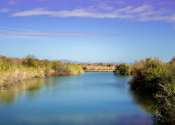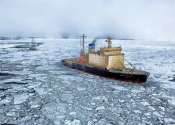Last update:
Earth news

Soil may release more carbon than expected, affecting climate change models
The accuracy of climate models depends on many factors—greenhouse gas emissions from industrial and transportation activity, farm animal "emissions," urban growth and loss of forests, and solar reflections off snow and ...
Earth Sciences
42 minutes ago
0
0

Curiosity reigns at SpaceX Starship environmental impact meeting on Space Coast
If SpaceX's Starship and Super Heavy ever finds a home on the Space Coast, what would be the most powerful orbital rocket to ever launch from here is going to have an environmental impact.
Environment
44 minutes ago
0
0

Five hotspots where floating plastic litter poses the greatest risk to North Atlantic marine life
Plastic has been found in every single part of the ocean, from the surface to the seafloor and from the tropics to the poles. Land-based sources of plastic account for the majority of this pollution, with plastic bags, bottles, ...
Environment
44 minutes ago
0
0

Stickiness in glacial space and time
Rising temperatures and melting ice play a central role in the unfolding Anthropocene—i.e., the most recent geologic period in Earth's history. What distinguishes the Anthropocene from prehistoric human impacts on the environment, ...
Environment
33 minutes ago
0
0

Competing Colorado River plans show seven states can't agree on how to manage critical water supply
Negotiators for the seven states that rely on the Colorado River for nearly every aspect of life cannot agree on how to distribute its shrinking water supplies in the coming decades.
Environment
50 minutes ago
0
0

Nearly 2 billion people globally at risk from land subsidence
Land subsidence is a geohazard caused by the sudden or gradual settling (years to decades) of the land surface due to the removal of subsurface material. This can be due to a variety of factors, both natural (such as earthquakes, ...

New research shakes up what we knew about Idaho's big 2020 earthquake that hit Boise
New research is shaking up what we know about Idaho earthquakes and the faults that cause them as scientists try to better understand the state's seismic activity.
Earth Sciences
1 hour ago
0
0

Why the first US climate disclosure rules are much weaker than planned and what they mean for companies
After two years of intense public debate, the U.S. Securities and Exchange Commission approved the nation's first national climate disclosure rules on March 6, 2024, setting out requirements for publicly listed companies ...
Environment
1 hour ago
0
0

Campus garden initiatives can help grow the next generation of environmental change-makers
No longer a problem of the future, the climate crisis is now driving devastating real-world impacts here in Canada and worldwide.
Environment
1 hour ago
0
1

Risks ease for Colorado River reservoirs after wet winter, but long-term challenges loom
After a wet year and a push to conserve water in the Southwest, federal officials say the risk of the Colorado River's reservoirs declining to critically low levels has substantially eased for the next couple of years.
Environment
2 hours ago
0
6

Big businesses in Australia will this year have to report their environmental impacts, but this alone won't drive change
This year, large businesses in Australia will likely have to begin reporting their environmental impacts, climate risks and climate opportunities.
Environment
1 hour ago
0
0

Washington's lackluster snowpack draws concerns, especially on the Olympic Peninsula
Not since 2015 has Washington's snowpack fallen so far below normal. Some regions of the state are preparing for another drought this summer. Others are still enmeshed in the drought that began last summer.
Environment
7 hours ago
1
2

Spekboom bushes protect earth but can they cool Earth?
Andre Britz pulled over his pick-up truck on a rocky mountain track to show off the nature-preserving powers of southern Africa's spekboom shrub.
Environment
9 hours ago
0
1

Deadly earthquakes trigger hunt for speedier alerts
Researchers in Europe have identified an underground signal that may be a precursor to strong quakes.
Earth Sciences
3 hours ago
0
15

Fewer fish and more algae? Scientists seek to understand impacts of historic lack of Great Lakes ice
Michigan Tech University biologists have been observing a remote Lake Superior island's fragile wolf population every winter since 1958, but they had to cut this season's planned seven-week survey short after just two weeks.
Environment
10 hours ago
0
2

Global hot streak continues. February, winter, world's oceans all break high temperature marks.
For the ninth straight month, Earth has obliterated global heat records—with February, the winter as a whole and the world's oceans setting new high-temperature marks, according to the European Union climate agency Copernicus.
Environment
10 hours ago
0
14

UN, France co-host first forum to decarbonize construction sector
France warned Thursday that the world's construction sector was not on track to decarbonize by 2050 as it co-hosts with the UN Environment Programme the first ever conference aimed at reducing the industry's impact on climate ...
Environment
3 hours ago
0
28

Understanding wind and water at the equator are key to more accurate future climate projections: Study
Getting climate models to mimic real-time observations when it comes to warming is critical—small discrepancies can lead to misunderstandings about the rate of global warming as the climate changes. A new study from North ...
Earth Sciences
22 hours ago
0
222

In peatland soil, a warmer climate and elevated carbon dioxide rapidly alter soil organic matter
Soils in northern freshwater wetlands, called peatlands, are cold, water-saturated, and acidic. These conditions slow microbes' decomposition of organic matter into greenhouse gases. This process stores carbon in the soil. ...
Environment
21 hours ago
0
1

Deep sea and sediments bring iron to Antarctic waters, finds researcher
Deep sea and sediments bring iron to Antarctic waters. The iron that fertilizes the waters around Antarctica mostly comes from the deep, upwelling waters and the sediments around the continent.
Earth Sciences
21 hours ago
0
34
Other news

NASA's network of small moon-bound rovers is ready to roll

What makes a pathogen antibiotic-resistant?

Dancing droplets' new spin on water harvesting

Tracing the spread of cacao domestication

Scientists develop new machine learning method for modeling chemical reactions

Satellite catches coastal flooding during California storms

The lows and lows of Antarctic sea ice

Greece records warmest winter on record: Expert

Social dynamics of family dogs: A peek behind hierarchies

Jet in Jupiter's atmosphere found to fluctuate in roughly four-year periods

Biologists discover the secrets of how gene traits are passed on

Study finds world's most prolific CO₂-fixing enzyme is slowly getting better

Deciphering catalysts: Unveiling structure-activity correlations

Mutant newts can regenerate previously defective limbs

Lifelike lab-grown skin developed from human stem cells






















































